 MyDogBreeds
MyDogBreeds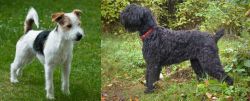 Parson Russell Terrier is originated from United Kingdom but Black Russian Terrier is originated from Russia. Parson Russell Terrier may grow 40 cm / 15 inches shorter than Black Russian Terrier. Parson Russell Terrier may weigh 52 kg / 114 pounds lesser than Black Russian Terrier. Both Parson Russell Terrier and Black Russian Terrier has almost same life span. Parson Russell Terrier may have less litter size than Black Russian Terrier. Parson Russell Terrier requires Moderate maintenance. But Black Russian Terrier requires High maintenance
Parson Russell Terrier is originated from United Kingdom but Black Russian Terrier is originated from Russia. Parson Russell Terrier may grow 40 cm / 15 inches shorter than Black Russian Terrier. Parson Russell Terrier may weigh 52 kg / 114 pounds lesser than Black Russian Terrier. Both Parson Russell Terrier and Black Russian Terrier has almost same life span. Parson Russell Terrier may have less litter size than Black Russian Terrier. Parson Russell Terrier requires Moderate maintenance. But Black Russian Terrier requires High maintenance
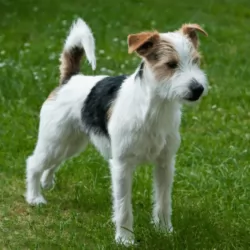 The Parson Russell Terrier hails from England and is a small to medium sized dog dating back to the 18th century. It is believed that Reverend John ‘Jack’ Russell was the developer of this dog. The Parson has always been involved with England’s sport of foxhunting.
The Parson Russell Terrier hails from England and is a small to medium sized dog dating back to the 18th century. It is believed that Reverend John ‘Jack’ Russell was the developer of this dog. The Parson has always been involved with England’s sport of foxhunting.
They’re spritely and quick and have been able to keep up on a hunt and take on a fox in its lair. The dog was first recognized in 1990 in the United Kingdom as the Parson Jack Russell Terrier and in America in 1997.
All the top kennel clubs recognize this dog as the Parson Jack Russell Terrier.
 During the cold war, the Soviet Union developed the Black Russian Terrier as a working military dog. During the early 1950’s, the Red Star Kennel developed this breed and in 2004 by the American Kennel Club. The Black Russian Terrier is not really a terrier at all, but a mid-sized working dog used for hunting and guarding or as a pet. The Red Star Kennel is thought to have developed the BRT using a wide variety of breeds – as many as seventeen – including breeds like the Newfoundland, the Rottweiler, the Caucasian Shepard Dog and a Giant Shepard and an Airedale. So, you can see the wide variety and several more breeds were added. The Red Star Kennel in Moscow was owned by the state and they developed the BRT for specific working conditions and not for appearance. They did not really care how it looked except that it had to be black. In 1957 the state allowed a few puppies to be sold to non-military breeders. These breeders began to breed the Black Russian Terrier for appearance as well as function.
During the cold war, the Soviet Union developed the Black Russian Terrier as a working military dog. During the early 1950’s, the Red Star Kennel developed this breed and in 2004 by the American Kennel Club. The Black Russian Terrier is not really a terrier at all, but a mid-sized working dog used for hunting and guarding or as a pet. The Red Star Kennel is thought to have developed the BRT using a wide variety of breeds – as many as seventeen – including breeds like the Newfoundland, the Rottweiler, the Caucasian Shepard Dog and a Giant Shepard and an Airedale. So, you can see the wide variety and several more breeds were added. The Red Star Kennel in Moscow was owned by the state and they developed the BRT for specific working conditions and not for appearance. They did not really care how it looked except that it had to be black. In 1957 the state allowed a few puppies to be sold to non-military breeders. These breeders began to breed the Black Russian Terrier for appearance as well as function.
As these breeders worked with the dogs, they spread the breed throughout Russia and into Finland, Poland, Hungary, Germany, Czechoslovakia and Germany. From there they spread to Australia, Canada and the United States. The breed standard was developed in 1958 and by 1996 an updated version of the standard was developed to reflect the dog we see today. In 1996 the United Kingdom also got their first introduction to the breed. They are still rare outside of Russian or previous Soviet Union states.
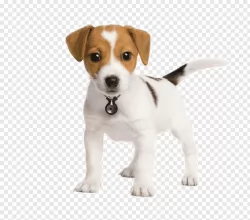 The Parson Jack Russell is essentially a white dog with black and tan or orange-fawn patches. He can be tri-colored too. The coat is either smooth, rough or broken.
The Parson Jack Russell is essentially a white dog with black and tan or orange-fawn patches. He can be tri-colored too. The coat is either smooth, rough or broken.
He stands at between 33–36cm tall at the withers and weighs between 5 and 8kg. Unlike the Jack Russell, the Parson Russell Terrier has longer legs. He has some longer hair on the head, legs and body. The ears are floppy wit the tip pointed forward. The tail has always been docked but when left long it it held high, slightly curving over the back.
Feisty, brave, cheeky and alert, the Parson Russell Terrier is an energetic dog who gets on well with children as he knows that this is essentially where his games come from.
He is bold and clever and you’ll be able to have him trained and socialized without any trouble. These little dogs are full of life and they are protective of their humans and their property, making excellent watchdogs.
 A little larger than a mid-sized dog, the Black Russian Terrier is strong, powerful, stable and alert. His head is block shaped and has a broad skull. The muzzle is square with a beard and mustache. A black, large nose and full black lips are matched with powerful and large jaws. He has a scissor bite and his ears should be triangles with rounded apexes. They have very large paws that are bear-like in appearance with thick black pads. They are also covered with hair. Their legs are muscular, powerful and strong. They have a cropped tail.
A little larger than a mid-sized dog, the Black Russian Terrier is strong, powerful, stable and alert. His head is block shaped and has a broad skull. The muzzle is square with a beard and mustache. A black, large nose and full black lips are matched with powerful and large jaws. He has a scissor bite and his ears should be triangles with rounded apexes. They have very large paws that are bear-like in appearance with thick black pads. They are also covered with hair. Their legs are muscular, powerful and strong. They have a cropped tail.
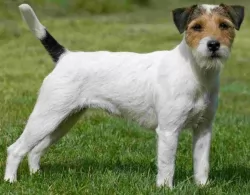 In general the Parson is a friendly,loving dog, fairly small but packed full of feisty personality.
In general the Parson is a friendly,loving dog, fairly small but packed full of feisty personality.
They make excellent pets for the entire family. He is an intelligent dog, but typical of most terriers he can be stubborn, but this can easily be fixed with training and socialization. With good care, he’ll make you a wonderful little pet and companion.
 The Black Russian Terrier is a working dog and he is confident, calm, self-assured and confident. He is responsive and intelligent, protective and fearless, loyal and aloof. He is not welcoming to strangers. If socialized well, he is enough of an independent thinker to be able to decide on his own who or what poses a threat to his family and what doesn’t. They get bored quickly because they are so smart. Keep him stimulated. These are strong, athletic dogs who will love to run with you, jog along side your bike, hike the mountain or just walk with you. Whatever your form of exercise is, the Black Russian Terrier can adapt to it. They also have a strong prey drive so don’t trust them with animals they do not know. They are ok with cats and dogs that they grow up with. They love to play with kids but be careful they don’t unintentionally knock the little ones down.
The Black Russian Terrier is a working dog and he is confident, calm, self-assured and confident. He is responsive and intelligent, protective and fearless, loyal and aloof. He is not welcoming to strangers. If socialized well, he is enough of an independent thinker to be able to decide on his own who or what poses a threat to his family and what doesn’t. They get bored quickly because they are so smart. Keep him stimulated. These are strong, athletic dogs who will love to run with you, jog along side your bike, hike the mountain or just walk with you. Whatever your form of exercise is, the Black Russian Terrier can adapt to it. They also have a strong prey drive so don’t trust them with animals they do not know. They are ok with cats and dogs that they grow up with. They love to play with kids but be careful they don’t unintentionally knock the little ones down.
The Black Russian Terrier matures later than other dogs. Treat the puppy the way you want the adult dog to be. If you don’t want a large dog on your bed don’t let the puppy sleep on the bed. He will soon be a large, powerful and strong dog with a mind of his own and you will not be able to keep him off the bed.
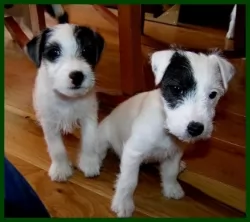 Your Parson Jack Russell can live to be between 12 and 15 years but nonetheless he does have some breed-related health issues to watch for.
Your Parson Jack Russell can live to be between 12 and 15 years but nonetheless he does have some breed-related health issues to watch for.
Eye conditions which can affect this dog include primary lens luxation,cataracts, corneal dystrophy and progressive retinal atrophy. With cataracts the lens of the eye develops a cloudy look resulting in poorer vision and sometimes blindness. Cataract surgery is available for dogs.
Your Parson Jack Russel should be lean and muscular and always full of energy. Avoid feeding him unhealthy treats which can lead to obesity and other health problems.
All kinds of parasites such as ticks, fleas and worms can invade your dog’s body. Roundworms, hookworms and tapeworms can cause havoc with their health and some of these parasites can even be transmitted to humans. It’s why it is important to get your puppy to the vet to be de-wormed and to get his first injections.
A liver disorder known as portosystemic shunt can mean that some of the blood supply doesn’t get to the liver and it doesn’t function properly. This will mean the liver can’t remove toxins from the bloodstream effectively.
 This is a healthy breed who faces some of the same issues other large dogs face such as dysplasia in the elbows and hips. Then they also face their own hereditary diseases such as Juvenile laryngeal paralysis, hyperuricosuria and polyneuropathy. They are also susceptible to heart disease, eye diseases, allergies, Panosteitis and hypertropic osteodystrophy. Let’s look at the major hereditary disease that are not so common.
This is a healthy breed who faces some of the same issues other large dogs face such as dysplasia in the elbows and hips. Then they also face their own hereditary diseases such as Juvenile laryngeal paralysis, hyperuricosuria and polyneuropathy. They are also susceptible to heart disease, eye diseases, allergies, Panosteitis and hypertropic osteodystrophy. Let’s look at the major hereditary disease that are not so common.
This occurs when the larynx arytenoid cartilages stop working and don’t operate so then the adjoining muscles don’t work either and the dog cannot swallow without the possible damage to the airway and the cannot breathe properly during exercise or while panting.
This is a condition that can occur in people and animals. This condition can lead to kidney or bladder stones as there is too much uric acid in their urine.
Like any form of neuropathy, in this disease many different nerves are damaged, and this can cause weak reflexes and tremors. There are effective treatments however.
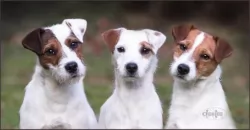 The Parson Russell Terrier has different coat types – the smooth and rough and both will require regular brushing. Rough coats will require plucking or clipping to avoid matting.
The Parson Russell Terrier has different coat types – the smooth and rough and both will require regular brushing. Rough coats will require plucking or clipping to avoid matting.
Check his eyes and ears regularly. Look inside his ears for excess wax and dirt which could lead to an ear infection. His nails should also be trimmed.
The best thing you can do for your Parson Russell Terrier if you don’t want your pet producing puppies is to have it spayed or neutered. Spaying for females or neutering for males decreases the likelihood of certain types of cancers too so it can be beneficial.
Diet is hugely important for a Parson Russell Terrier and the food you decide for him can impact his health. Many time those ‘treats’ you feed your pet do nothing more but give him a stomach ache.
It's tempting to pop chocolates, popcorn, nuts and ice cream into your pets mouth when he is so adorable but in the long run it is shortening his life. All he basically requires and needs is a simple, consistent diet of the top commercially manufactured foods mixed with some tasty home made food from time to time.
Boiled chicken, brown rice and vegetables such as sweet potatoes, carrots and spinach will do your pet wonders. Ensure he always has fresh, cool water available to him.
 This is a large, working dog that needs healthy nutrition. Feed once or twice a day but do not overfeed. Don’t let your Black Russian Terrier get overweight. Proper nutrition for puppies is critical given the nutrionally based diseases discussed below.
This is a large, working dog that needs healthy nutrition. Feed once or twice a day but do not overfeed. Don’t let your Black Russian Terrier get overweight. Proper nutrition for puppies is critical given the nutrionally based diseases discussed below.
This is a high energy dog that needs to work. He doesn’t just want to work, he needs to work. So, find him a job and one that includes a lot of exercise. He needs consistent and firm training but will respond well and excel in Obedience Trials. They are good at Schutzhund and agility. They need plenty of exercise and will be unhappy and destructive without enough and a job. He needs to burn off that energy.